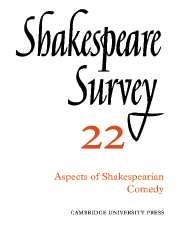Book contents
- Frontmatter
- Old and New Comedy
- An Approach to Shakespearian Comedy
- Shakespeare, Molière, and the Comedy of Ambiguity
- Comic Structure and Tonal Manipulation in Shakespeare and Some Modern Plays
- Laughing with the Audience: ‘The Two Gentlemen of Verona’ and the Popular Tradition
- Shakespearian and Jonsonian Comedy
- Two Magian Comedies: ‘The Tempest’ and ‘The Alchemist’
- ‘Thou that beget’st him that did thee beget’: Transformation in ‘Pericles’ and ‘The Winter’s Tale’
- The Words of Mercury
- Why Does it End Well? Helena, Bertram, and The Sonnets
- Some Dramatic Techniques in ‘The Winter’s Tale’
- Clemency, Will, and Just Cause in ‘Julius Caesar’
- Thomas Bull and other ‘English Instrumentalists’ in Denmark in the 1580s
- Shakespeare in the Early Sydney Theatre
- The Reason Why: The Royal Shakespeare Season 1968
- The Year's Contributions to Shakespearian Study 1 Critical Studies
- 2 Shakespeare’s Life, Times and Stage
- 3 Textual Studies
- Index
- Plate Section
An Approach to Shakespearian Comedy
Published online by Cambridge University Press: 28 March 2007
- Frontmatter
- Old and New Comedy
- An Approach to Shakespearian Comedy
- Shakespeare, Molière, and the Comedy of Ambiguity
- Comic Structure and Tonal Manipulation in Shakespeare and Some Modern Plays
- Laughing with the Audience: ‘The Two Gentlemen of Verona’ and the Popular Tradition
- Shakespearian and Jonsonian Comedy
- Two Magian Comedies: ‘The Tempest’ and ‘The Alchemist’
- ‘Thou that beget’st him that did thee beget’: Transformation in ‘Pericles’ and ‘The Winter’s Tale’
- The Words of Mercury
- Why Does it End Well? Helena, Bertram, and The Sonnets
- Some Dramatic Techniques in ‘The Winter’s Tale’
- Clemency, Will, and Just Cause in ‘Julius Caesar’
- Thomas Bull and other ‘English Instrumentalists’ in Denmark in the 1580s
- Shakespeare in the Early Sydney Theatre
- The Reason Why: The Royal Shakespeare Season 1968
- The Year's Contributions to Shakespearian Study 1 Critical Studies
- 2 Shakespeare’s Life, Times and Stage
- 3 Textual Studies
- Index
- Plate Section
Summary
Anything like a serious probing into the nature of Shakespearian Comedy, an attempt to discover, as it were, its governing principle, has been rare. One may hold the view that such an effort is hardly necessary, that, as has been suggested in the case of Tragedy, each Comedy could best be studied for its peculiar kind of unity of theme, structure, and effect, rather than as illustrative of the Shakespearian comic idea.
Shakespeare, at any rate, seems to write his Comedy with little concern for conformity to the established genre. The tradition associated with the form gave but a general direction to his attitudes. 'What distinguishes Shakespeare's Comedies from most contemporary ones is the amount of blending. Each play is sharply individualized, and yet nearly every one contains in different proportion all the elements of the others.'1 The peculiar blend of several modes has produced a kind of 'polyphonic music', to use Miss Bradbrook's phrase, asking of the reader a continual switching of interest and also a capacity to respond with a kind of multi-consciousness to the situation.
- Type
- Chapter
- Information
- Shakespeare Survey , pp. 7 - 14Publisher: Cambridge University PressPrint publication year: 1970

